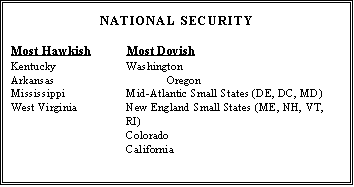Overview

Over the past four years, the American electorate has been dealt a series of body blows, each capable of altering the political landscape. The voting system broke down in a presidential election. A booming economy faltered, punctuated by revelations of one of the worst business scandals in U.S. history. And the country endured a devastating attack on its own soil, followed by two major wars.
National unity was the initial response to the calamitous events of Sept. 11, 2001, but that spirit has dissolved amid rising political polarization and anger. In fact, a year before the presidential election, American voters are once again seeing things largely through a partisan prism. The GOP has made significant gains in party affiliation over the past four years, but this remains a country that is almost evenly divided politically yet further apart than ever in its political values.
The Pew Research Center’s longitudinal measures of basic political, economic and social values, which date back to 1987, show that political polarization is now as great as it was prior to the 1994 midterm elections that ended four decades of Democratic control in Congress.

But now, unlike then, Republicans and Democrats have become more intense in their political beliefs.
This is seen clearly in the growing partisan gap over national security, which is now greater than in the late 1980s. In the wake of the Sept. 11 attacks, members of both parties, but especially Republicans, became more supportive of an assertive national security policy as seen in attitudes on the use of force and other issues. Yet in the past year many Democrats have shifted away from that approach as they have become embittered by the war in Iraq. By comparison, the change among Republicans has been far more modest. (More on foreign policy, p. 7; for information about values scales, see methodology, p. 79).
Over the past four years, Democrats also have become more critical of business and much stronger advocates of the social safety net and their differences with Republicans have increased as a result. Ironically, one of the few areas in which the partisan gap has narrowed in recent years is in perceptions of the scope and efficiency of government. The widespread hostility Republicans felt toward the federal government has dissipated now that their party controls all of the levers of power in Washington.

Perhaps the most striking evidence of a growing partisan disparity is the extent to which Republicans, Democrats and independents now judge their personal financial situation differently. Republicans are at least as satisfied financially as they were four years ago, but Democratic personal contentment has declined significantly since 1999. Independents also have become more negative about their personal financial situation over the past four years, to the point where their economic views now mirror those of Democrats.
The Pew Research Center’s political values survey, conducted among 2,528 adults July 14-Aug. 5, examines the core beliefs that form the basis of public opinion on a broad range of topics foreign policy and civil liberties, religion and social values, government and voting, and other issues. These values, which we have analyzed at the start of recent presidential election campaigns, ultimately will shape the decisions voters will make a year from now. A second nationwide survey was conducted Oct. 15-19, among 1,515 adults, to update recent trends on opinion toward the president’s reelection and the situation in Iraq.
As part of this project, the Pew Research Center for the People and the Press also has produced a detailed analysis of recent trends in party affiliation, based on about 80,000 interviews conducted over the past three years. This analysis shows that the GOP, which lagged well behind the Democrats in party affiliation for most of the past century, achieved significant nationwide gains after Sept. 11 and has drawn even with the Democrats. As it now stands, more voters identify with the GOP both in so-called “Red” states those that consistently have voted Republican in recent presidential elections but also in a number of swing states like Michigan and Florida. At the same time, Democrats have lost ground in swing states and have not picked up adherents in “Blue” states those that have gone Democratic in recent elections.
But these favorable trends for the GOP are imperiled by several factors, including rising discontent with national conditions and concern over the war with Iraq. Moreover, independents continue to share a common point of view with Democrats, not just in their financial attitudes but in their beliefs about national security. In the post-Enron environment, business and regulation is another area of strong agreement between Democrats and independents; only Republican opinions seem largely unaffected by the scandals.
The overtime election of 2000 is the sole calamitous event of the past four years to have not left a mark on public thinking. Americans do not feel more disenfranchised or unheeded by their political leaders than they did four years ago. If anything, there is somewhat less overall cynicism and distrust of government, mostly because Republican discontent with government has fallen off sharply. African Americans, who at the time expressed the most outrage over the way the 2000 presidential election was resolved, are no more likely to say that their vote does not count than they were four years ago. However, African Americans, who are overwhelmingly critical of the Bush administration, feel much more estranged from government than they did four years ago.
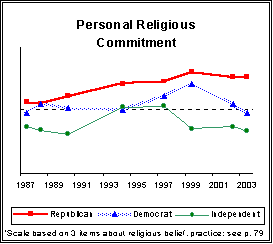
Ironically, one of the significant changes in the political landscape appears to have little direct connection to the events of recent years. This year’s Pew survey finds a wider gap in strong religious commitment between Republicans and Democrats than at any time over the 16-year period that the Pew Research Center has measured basic political, social and economic attitudes. This pattern reflects the growing number of white evangelical Protestants in the U.S. who affiliate with the Republican party.
But the partisan gap over most social values, while substantial, has not increased in recent years. Over the past decade there has been a decided shift across the political spectrum in favor of tolerance on issues relating to homosexuality and race. On abortion, by comparison, there has been very little change in attitudes over the course of the 1990s, though the partisan gap on this issue also remains large.
GOP Gains, Parties Now at Parity
As the electorate has become more polarized in its political values, it has become more evenly divided in partisan affiliation. Throughout President Clinton’s second term the Democrats held about a six-point advantage over the GOP among the general public. That held steady through the first nine months of Bush’s first year in office. But since the Sept. 11 attacks, the Democratic advantage has vanished.
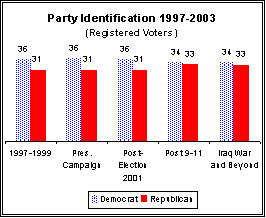
In Pew Center surveys conducted since the Iraq war earlier this year, 30% of Americans identify themselves as Republicans, 31% as Democrats and 39% as independents or other. When that combined sample is winnowed to registered voters, the partisan breakdown is just as narrow 33% Republican, 34% Democrat, 33% independent or other.
Republican gains have come across the board, both geographically and demographically. The GOP has made significant increases in party allegiance in 13 of 50 states since 2000, and six of these 13 have been crucial swing states in recent elections such as Florida and Michigan. The Democrats have even lost some ground in states that have gone consistently to the Democratic candidate in recent presidential elections, such as California and Washington. In fact, the Democratic advantage in Blue states is now about what it was nationwide during Clinton’s second term.
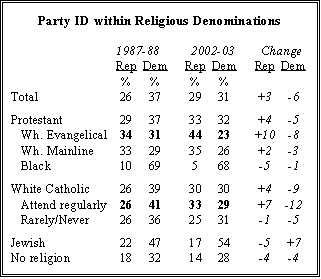
Demographically, there have been increases in Republican party affiliation in nearly every major voting bloc, except among African Americans. Republicans have made some of their greatest gains among Hispanics in the West and Texas, white Catholics and white evangelical Protestants. The changes among religious groups have been dramatic, particularly when current party affiliation is compared to 1987-1988, the first two years of the Pew values surveys. Republicans now hold nearly a two-to-one advantage over Democrats among white evangelical Protestants (44%-23%) and the GOP has drawn even among white Catholics. Moreover, many of the Republican gains among these groups have occurred since the 2000 election. (See Part 1: Party Affiliation; p. 13).
Yet the net effect of all these changes is merely to reinforce the sense of a nation whose political alignment is nearly symmetrical. In interviews with nearly 9,000 registered voters conducted since the Iraq war began, Democrats hold a ten-point advantage in the Blue states; Republicans are ahead by five points in the Red states (37%-32%). And the two parties are dead even in the swing states (33%-33%).
Bush Runs Even Against Generic Democrat

Despite the GOP gains since 2000, the electorate splits about evenly on a second term for the president, which reflects the downturn in his approval ratings in recent months (now at 50%). In a race against an unnamed Democrat, 42% back the president while the same percentage favors the Democrat. The president’s support in the reelection test strikingly parallels his vote in 2000 by gender, region of the country, race and religion (see chart p. 23).
While Bush runs even against an unnamed Democrat, he still runs well ahead of all his Democratic rivals, even those such as Rep. Dick Gephardt, Sen. Joe Lieberman and Sen. John Kerry, who have relatively broad name recognition. Bush’s two predecessors in the Oval Office both were in statistical dead-heats against an unnamed challenger at about this point in their campaigns, although they were to experience different fates on Election Day one year later (Bush Sr. trailed by 41%-44% in 1992, Clinton was tied with an unnamed Republican 35%-35% in 1996).
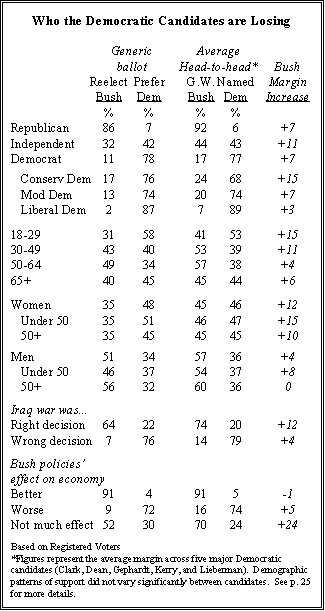
A comparative analysis of Bush’s showing against a generic Democrat and named opponents finds that women, especially women under age 50, conservative Democrats and independents are among the most reluctant to support one of the Democratic candidates in a head-to-head test with Bush, even though they have reservations about a second term for the president. For example, women favor a generic Democrat by 48%-35%. But when asked to choose between Bush and actual Democratic candidates, women are evenly divided (45% Bush, 46% Democrat). This also is generally true of voters who say Bush’s economic policies have not had much of an impact either positive or negative on the economy.
The National Security Party
The growing partisan differences over national security are seen both in fundamental values and in opinions on specific issues. Republicans have become decidedly more militant, while Democrats, if anything, have become less so, especially in the past year as they have increasingly come to oppose the war in Iraq.
By more than eight-to-one (85%-10%), Republicans believe the war was the right decision. Independents by a substantial margin agree with the decision to go to war (59%-35%). But Democrats, by 54%-39%, feel the war was the wrong decision. Attitudes toward Iraq color opinions on a number of security issues. Republicans overwhelmingly feel the use of force is justified against potential enemies 82% say it is often or sometimes justified; many fewer independents and Democrats agree (62%, 52%).
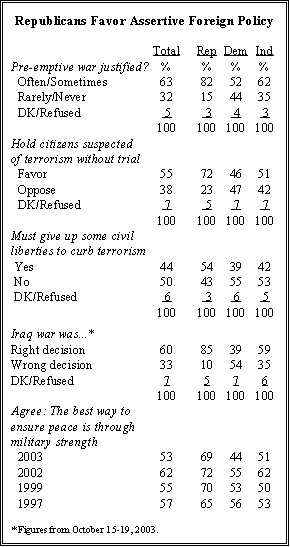
Consequently, the partisan gap over basic national security values has never been more pronounced. Since 1987, Pew has been asking people whether they agree with this statement: “The best way to ensure peace is through military strength.” From the beginning, more Republicans than Democrats agreed with that statement. But over the past year the gap has widened to 25 points because of sharp decline in Democratic agreement (44% now, 55% in 2002).
There are also sharp partisan differences over trading off civil liberties for the sake of the war on terrorism. More than half of Republicans (54%) feel such a tradeoff is necessary; just 39% of Democrats agree. And Republicans are far more supportive than Democrats of the administration’s policy of holding suspected terrorists without trial.
On most national security measures, the views of independents are much closer to those of Democrats than Republicans. Barely half of independents (51%) feel military strength provides the basis for peace, down 11 points in the past year. The difference between independents and Republicans on this measure is more than twice as large as the gap between independents and Democrats (18 points vs. seven points).
Social Safety Net: Democrats More Insistent
Compared with the Clinton years, Democrats today are much more inclined to support increased government help for the poor. Indeed, nearly three-quarters of Democrats (72%) now believe the government should help more needy people even if it means going deeper into debt.
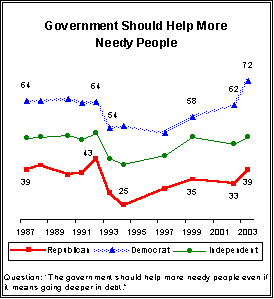
That is a sharp increase from four years ago (58%) and by far the highest level of Democratic support for that idea in the Pew values surveys. Increased Democratic support for an expanded social safety net, even if it means a bigger deficit, have come mostly among from white Democrats (up 10 points over the past year). Black Democrats continue to express strong support for increased social spending even at the cost of a higher deficit (78% agree).
Opinion on this issue among independents and Republicans has been more stable, and far less supportive. Half of independents support more aid for the poor if it means adding to the deficit, while just 39% of Republicans express that view.
As is the case with views on national security, basic political values on the social safety net are reflected in public opinion on current issues. Asked about proposals in Congress to provide a prescription drug benefit as part of the Medicare program, majorities of Democrats and independents express concern that the benefit will not go far enough (60%, 53%). This is far less of a concern to Republicans just 40% think the drug benefit will not be generous enough.
Race: More Social Comity, Policy Differences Persist

Over the course of the Pew values surveys, there has been a sea change in the public’s views on interracial dating. It was a divisive topic when the surveys began in 1987 fewer than half (48%) felt it was appropriate for blacks and whites to date. But today, this is largely a settled issue: 77% accept interracial dating.
Yet while the public’s personal attitudes on race have evolved, there remains a substantial divide between whites and African Americans on how to further black economic progress. Many more blacks than whites strongly believe that discrimination is a continuing problem. And far more whites than blacks continue to agree with the statement “We have gone too far in pushing equal rights in this country” (46% of whites, 26% of African Americans).
Consequently, there remains a wide racial divide over possible remedies for discrimination. Although African American support for racial preferences is lower today than in the 1980s, a majority (55%) still favors preferences as means to improve the position of blacks and other minorities; a larger majority of whites (74%) disagree.
Compared with older Americans, young people are far more comfortable with social interaction between the races and fewer hold the view that the nation has gone too far in pursuing equal rights. And regional differences on racial attitudes are shrinking, except on the issue of interracial dating where six-in-ten southern whites feel it is appropriate (61% compared with 79% of whites in other regions).
Race continues to divide Democrats and Republicans. The partisan gap in opinion on racial issues is as great today as it was in the 1980s. Independents are closer to the Democrats than to the Republicans on these issues, but they have been moving in the GOP’s direction in the past few years. More than four-in-ten Democrats (42%) approve of preferential treatment for blacks and other minorities, compared with 28% of independents and just 16% of Republicans.

Less Cynicism About Government
On the surface, American attitudes about the electoral process and about the fairness of government appear little changed in recent years, and these views are similar to those expressed in the late 1980s. The raw anti-government anger so prevalent in the mid-1990s especially in 1994 subsided in the latter part of the decade and remains fairly low today. For example, the overall percentage saying that the government is run for the benefit of all fell from 57% in 1987 to a low of 42% in 1994; by 1999 it had recovered to 49% and now stands at 52%.
But today’s calm waters conceal significant partisan divisions below the surface. As Republicans have become more happy with the responsiveness of the system and the power of their votes, Democrats and, to a degree, independents have become significantly more cynical. Today, 69% of Republicans say the government is run for the benefit of all, while just 44% of Democrats and 47% of independents agree.
Yet there is little evidence that the disputed presidential election of 2000 left a lasting imprint on the public. Black Democrats, who were at the center of controversy over uncounted votes in Florida, are no more cynical about the importance of their vote than are white Democrats. And though criticism of government is growing among all Democrats, they express far less frustration and cynicism about the political system than Republicans and independents did in 1994.
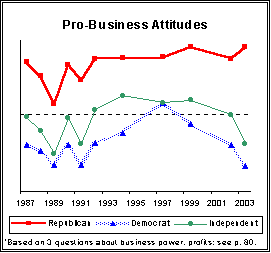
Business Scandals’ Minimal Impact
Overall American views of business and government regulation have been modestly affected by the string of business scandals over the past few years. The public remains of two minds about business most Americans (75%) feel the country’s strength is based on the success of business. Yet consistent majorities feel corporations make too much money and amass too much power.
Last year marked the first time in the Pew values surveys when fewer than half of Americans (48%) agreed with the statement “Government regulation of business usually does more harm than good.” But this year, as in all other Center surveys over the years, a small majority once again feels the harm of government regulation outweighs the good (53%).
But lack of change notwithstanding, attitudes toward business have taken on a more partisan cast. The idea that corporations are too powerful is overwhelmingly embraced by Democrats 87% say that now, up nine points since the late 1990s (78% in 1999). By contrast, a declining number of Republicans say corporations are too powerful (62%, down from 66% four years ago).
Other Findings:
Americans are conflicted over complex issues relating to reproduction and research. More than seven-in-ten (72%) favor protecting the rights of the unborn in almost all cases. But a sizable majority (58%) say they are more interested in finding cures for diseases than in protecting human embryos.
Many more people express concern that business corporations are collecting too much information on them (77%) than say the same about the government (57%). Nearly as many Republicans as Democrats or independents voice concern over excessive business scrutiny. But Republicans are decidedly less troubled than either Democrats or independents that the government is collecting too much information on them.
Support for tighter immigration controls has risen only modestly since 1999, but the intensity of that support has grown sharply especially among Republicans. More than half of Republicans (53%) completely agree that immigration controls need to be tightened, up from 38% four years ago. There has been a much smaller increase in strong support for tougher immigration curbs among Democrats and independents.
Standout States on Basic Attitudes and Values
Religion:
States ranked by responses to questions about importance of prayer in daily life, belief that everyone will be called before God on Judgment Day, and belief in the existence of God.
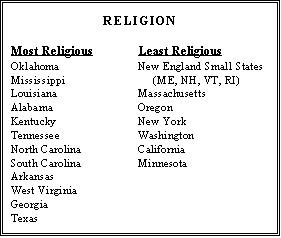
Social Values:
States ranked by responses to questions about social beliefs and values such as homosexuality, acceptable content for school libraries, the role of women, the issue of day care, AIDS, family and marriage, and ideas about good and evil.
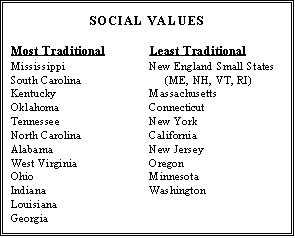
National Security:
States ranked by agreement with these statements: “The best way to ensure peace is through military strength,” “We should all be willing to fight for our country, whether it is right or wrong,” “American lives are worth more than the lives of people in other countries,” “It is my belief that we should get even with any country that tries to take advantage of the U.S.” See the methodology for details about each set of questions.
